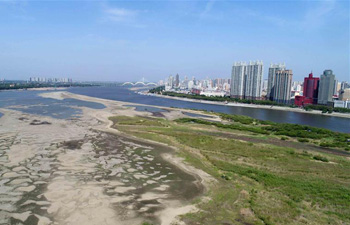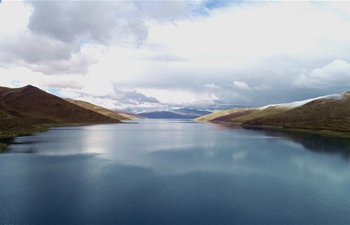by Cristobal Chavez Bravo
SANTIAGO, June 3 (Xinhua) -- Two Chilean artists are transforming stones in the coastal commune of Navidad into works of art, each in his own unique way.
Located two hours south of the capital Santiago, Navidad's 20-kilometer-long shoreline, where the Rapel River flows into the Pacific Ocean, provides sculptor Pedro Salinas with an abundance of raw material.
After sifting through the water to find the right stone for his latest project, Salinas heads home to his tool-filled worktable, where he cuts, carves and polishes each piece.
"I discovered that I could give a bit of life to the stones, such as by polishing them to reflect their colors more," Salinas told Xinhua.
He makes a living from selling the resulting sculpture or decorative accent for the home, some of which sell for a considerable price.
His inspiration, he says, comes from the sea and its starfish, snails and other marine life, or the waves washing up on shore.
Sculpting stone is a noisy business. It often sounds as if he is working with giant machinery and materials, even though he is using hand tools to alter the stone's surface, a procedure that requires patience and dedication.
"I like it because people value my work," said Salinas, who describes his craft as "giving life and functionality to stones."
Salinas isn't the only Chilean to see beauty in stones. Some 57 years ago, Chilean poet and Nobel laureate Pablo Neruda published an anthology titled "The Stones of Chile."
In fact, stones figured throughout his works, as this sampling of lines shows: "In the wave-strike over unquiet stones/the brightness bursts and bears the rose;" and "I'm coming, I'm coming, wait up, stones!"
Salinas isn't even the only Navidad native to find inspiration in stones. Elson Rocuant makes sculpture and garden decorative items out of a blend of materials made to look like stone.
"It's a cement made with natural fibers derived from paper or other recycled fibers that are fire retardant. It's light, resistant and malleable, and specially made for making plant pots, small pools, or items for gardens," said Rocuant.
His specialty is making planters with elaborate sea-themed designs.
"The advantage of this (material) is that in addition to being more environmentally friendly (than traditional planters), it helps plants a lot, because plastics heat the soil and the roots," said Rocuant.
Like Salinas and Neruda before him, Rocuant has found inspiration in Chile's lengthy coastline and the age-old stones that move with the tide.

















